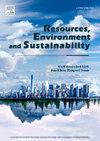Ecosystem service bundles under SSP-RCP and local scenarios: A pathway to comprehensive spatial planning for sustainability
IF 12.4
Q1 ENVIRONMENTAL SCIENCES
引用次数: 0
Abstract
Global and local efforts have each made significant contributions to advancing sustainable development, yet systematic research on the role of global strategies in guiding local practices remains scarce. This study takes the Yangtze River Delta urban agglomerations as a case study and introduces an innovative framework that integrates global perspectives with local practices. By conducting a comparative analysis of ecosystem service (ES) bundles under the climate change scenario and a local scenario group, the study identifies critical pathways for optimizing future spatial planning. The findings suggest that merely increasing ESs supply is not the primary objective of the local spatial management, addressing key trade-offs among ESs should take precedence. For instance, promoting sustainable agriculture can mitigate conflicts between ESs, reduce boundaries between woodland and cropland, foster synergies among multiple ESs, and alleviate the imbalance in ecological development between the northern and southern regions. In highly urbanized areas, the growth of urban green spaces can also contribute positively to sustainable development. This framework not only bridges the gap between global strategies and local sustainable development practices but also expands the application of ES bundles in spatial planning and management. It offers new theoretical insights and practical solutions for achieving sustainability.

SSP-RCP和地方情景下的生态系统服务包:可持续发展的综合空间规划路径
全球和地方的努力都为促进可持续发展作出了重大贡献,但关于全球战略在指导地方实践方面的作用的系统研究仍然很少。本研究以长三角城市群为例,引入了一个将全球视角与本土实践相结合的创新框架。通过对气候变化情景和局地情景组下生态系统服务包的对比分析,确定了优化未来空间规划的关键路径。研究结果表明,仅仅增加可再生能源的供应并不是地方空间管理的主要目标,解决可再生能源之间的关键权衡应该优先考虑。例如,促进可持续农业可以缓解生态系统之间的冲突,减少林地和耕地的界限,促进多个生态系统之间的协同效应,缓解南北生态发展的不平衡。在高度城市化的地区,城市绿地的增长也可以为可持续发展做出积极贡献。这一框架不仅弥合了全球战略与地方可持续发展实践之间的差距,而且扩大了生态系统捆绑包在空间规划和管理中的应用。它为实现可持续发展提供了新的理论见解和实践解决方案。
本文章由计算机程序翻译,如有差异,请以英文原文为准。
求助全文
约1分钟内获得全文
求助全文
来源期刊

Resources Environment and Sustainability
Environmental Science-Environmental Science (miscellaneous)
CiteScore
15.10
自引率
0.00%
发文量
41
审稿时长
33 days
 求助内容:
求助内容: 应助结果提醒方式:
应助结果提醒方式:


